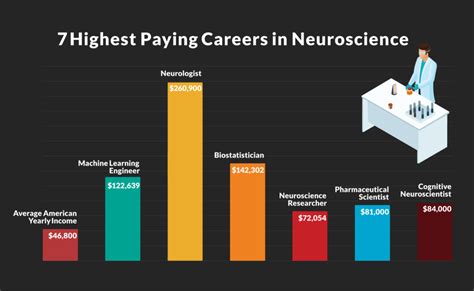Neuro Careers

The field of neuroscience has experienced tremendous growth and advancement in recent decades, opening up a wide range of exciting career opportunities for individuals passionate about the brain and its complexities. From research and academia to clinical practice and industry, the demand for neuro professionals is on the rise. In this comprehensive guide, we will explore the diverse career paths within the realm of neuroscience, shedding light on the skills, education, and experiences required to pursue a fulfilling career in this fascinating field.
The Neuroscience Career Landscape

Neuro careers encompass a vast array of specialties, each offering unique challenges and opportunities for growth. Whether you’re drawn to the intricate workings of the brain’s molecular mechanisms, the behavioral and cognitive aspects of neuroscience, or the clinical applications that improve patients’ lives, there’s a niche waiting to be explored.
Research and Academia: Unraveling Neural Mysteries
At the forefront of neuroscience innovation, research scientists and academics play a pivotal role in advancing our understanding of the brain. With a strong foundation in biology, chemistry, physics, and mathematics, these professionals delve into the intricacies of neural circuits, neurotransmitter systems, and the brain’s response to various stimuli. From studying the fundamental processes of learning and memory to investigating the genetic underpinnings of neurological disorders, their work forms the bedrock of future breakthroughs.
Within the academic realm, opportunities abound for those with a passion for teaching and mentoring. Faculty positions at universities and colleges offer the chance to impart knowledge to the next generation of neuro professionals while contributing to cutting-edge research. The educational journey for aspiring researchers often involves obtaining advanced degrees such as a Master's or Ph.D., complemented by hands-on experience in laboratory settings.
| Research Focus | Required Skills |
|---|---|
| Neuroimaging | Proficiency in MRI, PET, and EEG techniques, data analysis, and interpretation |
| Molecular Neuroscience | Molecular biology techniques, gene editing, protein analysis |
| Cognitive Neuroscience | Psychological assessment, experimental design, data analysis |

Clinical Neuroscience: Impacting Patient Care
For those inclined towards direct patient interaction, clinical neuroscience offers a rewarding career path. Neurologists, neurosurgeons, and neuropsychologists are at the forefront of diagnosing and treating a diverse range of neurological conditions, from common headaches and migraines to complex disorders like epilepsy, Parkinson’s disease, and stroke. These professionals rely on a combination of medical expertise, diagnostic skills, and empathy to provide the highest standard of care.
Neurology residency programs, often lasting several years, are the gateway to becoming a practicing neurologist. These rigorous training periods equip residents with the skills needed to assess patients, order and interpret diagnostic tests, and develop comprehensive treatment plans. Similarly, neurosurgeons undergo extensive surgical training to master the intricate techniques required for brain and spinal cord procedures.
In the field of neuropsychology, professionals assess and treat patients with cognitive impairments resulting from brain injuries, degenerative diseases, or psychiatric conditions. Their work involves a deep understanding of brain-behavior relationships, cognitive assessment tools, and therapeutic interventions. Obtaining a doctoral degree in clinical or counseling psychology, followed by specialized training in neuropsychology, is typically the path to this career.
Neurotechnology and Industry: Shaping the Future
The intersection of neuroscience and technology has given rise to a burgeoning field of neurotechnology, where professionals develop innovative tools and devices to enhance our understanding of the brain and improve neurological health. From brain-computer interfaces that restore movement in paralyzed individuals to neuroprosthetics that aim to replace lost sensory functions, the possibilities are limitless.
Industry careers in neurotechnology often attract individuals with diverse skill sets, including engineering, computer science, and neuroscience. These professionals collaborate to design and refine neurodevices, ensuring their safety, efficacy, and user-friendliness. The regulatory landscape and clinical trial processes also play a crucial role in bringing these innovative technologies to market.
In addition to neurotechnology, the pharmaceutical and biotechnology industries offer lucrative careers for neuro professionals. Drug discovery and development, clinical research, and medical affairs roles provide opportunities to contribute to the creation of life-changing medications for neurological disorders. A background in neuroscience, coupled with business acumen, can open doors to leadership positions in these sectors.
Education and Training: Building a Neuro Career

The path to a neuro career is as diverse as the field itself, and the educational requirements vary depending on the chosen specialty. However, a strong foundation in the basic sciences, including biology, chemistry, and physics, is often a prerequisite. Many aspiring neuro professionals pursue undergraduate degrees in neuroscience, psychology, or related fields to gain a comprehensive understanding of the brain and its functions.
Advanced Degrees: Opening Doors
For those seeking research or clinical careers, advanced degrees such as a Master’s or Ph.D. in neuroscience, neurology, or a related discipline are typically required. These graduate programs provide specialized training, allowing students to delve deeper into their chosen areas of interest and develop the skills needed for independent research or clinical practice.
Medical school is the gateway to becoming a neurologist or neurosurgeon, offering a rigorous curriculum that covers the entire spectrum of medical knowledge. Residency programs, often lasting several years, provide hands-on training in neurology or neurosurgery, allowing residents to refine their diagnostic and therapeutic skills under the guidance of experienced mentors.
Similarly, doctoral programs in psychology or neuropsychology equip students with the knowledge and skills needed to assess and treat patients with neurological and psychiatric conditions. These programs often involve a combination of coursework, research, and clinical training, preparing graduates for licensure and independent practice.
Continuing Education and Professional Development
The field of neuroscience is ever-evolving, and staying abreast of the latest advancements is crucial for career success and patient care. Continuing education courses, workshops, and conferences provide opportunities to expand one’s knowledge, network with peers, and explore new areas of interest. Professional organizations often offer certifications and credentials that can enhance a neuro professional’s credentials and marketability.
Skills and Traits for Success in Neuro Careers
While the specific skills and traits required for neuro careers vary depending on the chosen path, there are certain fundamental attributes that are highly valued across the field. These include:
- Curiosity and Critical Thinking: A passion for unraveling complex neural mysteries and the ability to think critically and analytically are essential.
- Attention to Detail: Whether conducting research, interpreting data, or providing patient care, a meticulous approach is crucial for accurate results and patient safety.
- Communication Skills: Effective communication is vital for conveying complex ideas to colleagues, patients, and the public. Strong writing skills are also important for scientific publications and grant proposals.
- Empathy and Compassion: For those working directly with patients, the ability to understand and empathize with their struggles is essential for providing compassionate care.
- Problem-Solving Abilities: Neuro professionals often face unique challenges, whether it's troubleshooting experimental designs or developing innovative treatment plans. Creative problem-solving skills are highly valued.
- Teamwork and Collaboration: Many neuro careers involve working as part of a multidisciplinary team, requiring strong collaboration and interpersonal skills.
Future Prospects and Emerging Opportunities
The future of neuroscience is bright, with rapid advancements in technology and a growing understanding of the brain’s complexities. As our knowledge expands, so do the opportunities for neuro professionals to make a meaningful impact. Here are some emerging areas to watch:
- Neuroinformatics: With the exponential growth of neuroscience data, professionals skilled in data analysis and management are in high demand. Neuroinformatics offers exciting opportunities to develop new tools and techniques for data visualization, analysis, and interpretation.
- Translational Neuroscience: Bridging the gap between basic research and clinical practice, translational neuroscience aims to accelerate the development of new treatments and therapies. Professionals in this field play a crucial role in bringing laboratory discoveries to the bedside.
- Neuroethics: As neuroscience advances, ethical considerations become increasingly important. Neuroethicists explore the social, legal, and philosophical implications of neurotechnologies and help guide responsible development and use of these tools.
- Precision Neuroscience: The future of neuroscience lies in personalized approaches to diagnosis and treatment. Precision neuroscience aims to tailor interventions to an individual's unique genetic makeup, lifestyle, and environmental factors, offering the promise of more effective and targeted therapies.
Conclusion: A World of Possibilities

The field of neuroscience offers a vast array of career opportunities, each with its own unique challenges and rewards. Whether your passion lies in research, clinical practice, or industry, the neuro career landscape is brimming with potential. With a strong foundation in the sciences, a curious mind, and a dedication to lifelong learning, you can forge a path that aligns with your interests and aspirations, making a meaningful impact on the understanding and treatment of the brain’s complexities.
What are the entry-level job opportunities in neuroscience?
+Entry-level positions in neuroscience often include research assistant roles, where you assist senior researchers in conducting experiments and analyzing data. Laboratory technician positions are also common, involving tasks such as maintaining lab equipment, preparing samples, and ensuring lab safety.
How do I choose a specialty within neuroscience?
+Choosing a specialty often involves exploring your interests and passions within the field. Consider your favorite courses, the topics that excite you the most, and the types of problems you’d like to solve. Whether it’s cognitive neuroscience, neuroimaging, or neurodevelopmental disorders, finding your niche is a personal journey.
What are the earning prospects in neuro careers?
+Earning potential in neuro careers varies widely depending on your chosen path and level of education. Researchers, academics, and clinicians with advanced degrees often command higher salaries. However, even entry-level positions can offer competitive compensation, especially in industries such as neurotechnology and pharmaceuticals.


